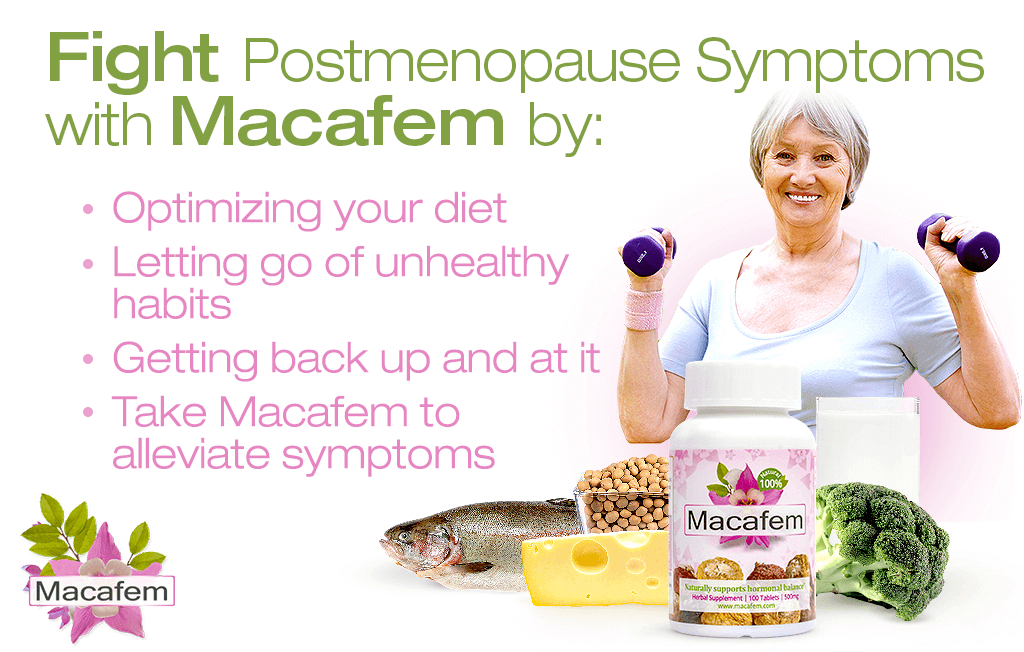Fight Postmenopause Symptoms with Macafem
Women who are exiting the menopausal transition may believe that relief is finally upon them as their reproductive years have officially ended. However, aside from the few menopause symptoms that may linger into this new stage of life, unfamiliar challenges may surface as more serious health conditions loom upon them in the presence of key reproductive hormone deficiencies, like estrogen and progesterone. Find out how you can fight postmenopause symptoms with an improved lifestyle and the help of Macafem for better results and a healthier you as you glide into your twilight years.

Optimizing your diet
Because postmenopausal women are at a greater risk of heart disease, they are encouraged to alter their diet to focus more on low-fat, low-sugar, low-salt options. This will reduce the risk of heart attacks and atherosclerosis, a deadly artery-clogging condition.
It is also important for women to consume calcium and vitamin D for optimal bone health. Calcium-rich foods include collard greens, broccoli, kale, dairy, and fortified foods, like almond milk. On the other hand, vitamin D is abundant in the flesh of fatty fish (salmon, tuna), fish liver oils, or fortified options of milk, cheese, and cereals.
Moreover, it is important for postmenopausal women with proven estrogen deficiencies to eat phytoestrogens, which are plant-based estrogens that help compensate for the lack of the endogenous hormone in the body. Phytoestrogenic foods include soybeans and soy products, flaxseed, legumes, oats, barley, etc.
Letting go of unhealthy habits
Smoking is a major risk factor of heart disease. Cut your chances of developing the potentially deadly cardiovascular condition by dropping the pack.
It’s no secret that stress can instigate or aggravate symptoms of hormonal imbalance, causing postmenopausal women further distress than before. Practice de-stressing techniques of yoga, tai chi, or qigong; deep breathing; mindfulness or body scan meditation; or guided imagery.
Getting back up and at it
Without a doubt, weight gain during the menopausal transition is one of the most common symptoms, and it is due to declining estrogen levels that contribute to concentration of fat to the abdomen. As such, this weight gain can carry into postmenopausal years, making it that much more difficult for women to shed the extra pounds.
Regular exercise for postmenopausal women does more than just lower their risk for heart disease, high blood pressure, osteoporosis, and obesity. It also helps ameliorate other common symptoms of hormonal imbalance, such as joint and back pain, insomnia, depressed moods, and more.
Good exercises for postmenopausal women include weight-bearing workouts, like walking and running, as well as moderate strength training to help increase muscle and bone mass. Thirty minutes a day five days a week is ideal, but moderate exercise three times a week is also acceptable for those just starting out.
Macafem for Postmenopause Symptoms
Macafem is a 100% natural herbal supplement that has been helping menopausal and postmenopausal women for years in combatting their pesky symptoms and keeping them in tip-top shape. Benefits of Macafem can be accredited to its natural hormone-balancing properties.
Macafem nourishes the endocrine system to encourage its own hormonal production, thus alleviating symptoms of imbalance that plague women as they transition out of their fertile years. By keeping hormone levels stable, women are at a reduced risk of developing more serious health conditions – heart disease and osteoporosis, among others – as long as they partake in preventative measures, many aforementioned.
John Hopkins Medicine. (n.d.). Staying Healthy After Menopause. Retrieved December 10, 2018, from https://www.hopkinsmedicine.org/healthlibrary/conditions/gynecological_health/staying_healthy_after_menopause_85,P00545
National Institutes of Health. (2018). Vitamin D. Retrieved December 10, 2018, from https://ods.od.nih.gov/factsheets/VitaminD-HealthProfessional/
National Osteoporosis Foundation. (n.d.). A Guide to Calcium-Rich Foods. Retrieved December 10, 2018, from https://www.nof.org/patients/treatment/calciumvitamin-d/a-guide-to-calcium-rich-foods/

